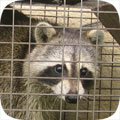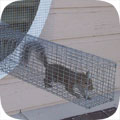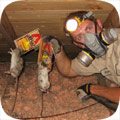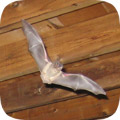- ansonia@wildlifeanimalcontrol.com
Call 24/7 for a free quote:
203-900-2225
Ansonia Wildlife Animal Control
Professional Wildlife Removal Company Servicing Ansonia, CT
If you have a problem with wildlife in your Ansonia home, your best option is to hire a company that specializes in Connecticut wildlife removal only. This is a specialty business, and regular pest control companies do not use the proper techniques to solve animal problems. I have spent many years reviewing Connecticut and Ansonia, and I recommend the following:
BearClaw Wildlife
Cell Phone: 203-900-2225
NOTE: If you have a dog or cat problem, call New Haven County Animal Services: 203-410-7716

BearClaw Wildlife specializes primarily in removing animals from attics of homes and buildings - this includes squirrels in attics, raccoons, and rats or mice in homes. Connecticut also has a documented problem with
bats in buildings, and BearClaw Wildlife is specially trained in bat removal. They also perform general wildlife trapping services, such as the capture and removal of skunks or opossums on the
property. Call 203-900-2225 to discuss your critter problem and schedule a same-day or next-day appointment. Click here to learn more about
what prices we charge in 2025.
When hiring a company to solve your wild animal problem, you want these features:
- Specializes in wildlife removal, not pest control
- Fully Connecticut and New Haven County licensed and insured
- Works 7 days per week (critters don't take weekends off)
- Performs full building inspections: enters and inspects attic
- Performs exclusion repairs, with guarantee against animal re-entry
- Offers cleanup of biohazardous wildlife waste
BearClaw Wildlife is a full-service Ansonia wildlife removal company. This is very different from a regular Ansonia pest control company. The pest control companies spray poison to kill insects. This is not at all
similar to wildlife removal. BearClaw Wildlife performs a full inspection of the home or property, and determines why the animal(s) are there, and if inside a building, how the animals got inside. All
animals (including rodents) are trapped and removed, or if possible, removed from the building using special exclusion devices. Once the animals are gone, preventative repairs are essential, and
cleanup is sometimes recommended.
 Ansonia wildlife trapping - it's not as simple as it may seem. It's illegal in Connecticut to trap without a license. Trap type is very important and there are many different types, bait is somewhat relevant, trap placement
is vital, and there are dozens of small things that are very important to know.
Safety is a concern. Then once the animal is trapped, it must be removed and dealt with in the proper manner according to Connecticut law. We offer Ansonia raccoon removal. Read more about how to get rid of raccoons.
Ansonia wildlife trapping - it's not as simple as it may seem. It's illegal in Connecticut to trap without a license. Trap type is very important and there are many different types, bait is somewhat relevant, trap placement
is vital, and there are dozens of small things that are very important to know.
Safety is a concern. Then once the animal is trapped, it must be removed and dealt with in the proper manner according to Connecticut law. We offer Ansonia raccoon removal. Read more about how to get rid of raccoons.
 Animals in attics - this is our specialty at BearClaw Wildlife. Many types of animals like to live in attics. This includes squirrels, raccoons, rats, mice, bats, birds, and even possums. Critters like to go into attics for a safe place to live
and raise their young. Removing animals from attics is very complex work, partly because of the presence of baby animals. If you need Ansonia squirrel removal, we can remove all the squirrels from your attic, and seal out any future ones. Read more about how to get rid of squirrels.
Animals in attics - this is our specialty at BearClaw Wildlife. Many types of animals like to live in attics. This includes squirrels, raccoons, rats, mice, bats, birds, and even possums. Critters like to go into attics for a safe place to live
and raise their young. Removing animals from attics is very complex work, partly because of the presence of baby animals. If you need Ansonia squirrel removal, we can remove all the squirrels from your attic, and seal out any future ones. Read more about how to get rid of squirrels.
 Rodent control must be done in a very specific way. First off, the most important thing is that all the openings that rats and mice can use to enter a house be sealed. Then all the rodents must be physically trapped and removed.
Never, ever use poison! Most Ansonia exterminators will just use this lazy poison technique to kill rodents, and it causes more harm than good - dead stinky rats, and it doesn't solve the problem. Call us for correct Ansonia rat removal. Read more about how to get rid of rats.
Rodent control must be done in a very specific way. First off, the most important thing is that all the openings that rats and mice can use to enter a house be sealed. Then all the rodents must be physically trapped and removed.
Never, ever use poison! Most Ansonia exterminators will just use this lazy poison technique to kill rodents, and it causes more harm than good - dead stinky rats, and it doesn't solve the problem. Call us for correct Ansonia rat removal. Read more about how to get rid of rats.
 Bat removal is a highly specialized task. Connecticut is known to have colonizing bats who often live in buildings. Bats love attics. If not removed, the colony can grow to a very large size over the years. The bat droppings are often corrosive and
cause health risks. The same goes for bird droppings on or in buildings. We perform Ansonia pigeon removal and bird control. But our specialty is Ansonia bat removal. We remove 100% of the bat colony and seal the building so that it's totally bat-proof. Read more about how to get rid of bats.
Bat removal is a highly specialized task. Connecticut is known to have colonizing bats who often live in buildings. Bats love attics. If not removed, the colony can grow to a very large size over the years. The bat droppings are often corrosive and
cause health risks. The same goes for bird droppings on or in buildings. We perform Ansonia pigeon removal and bird control. But our specialty is Ansonia bat removal. We remove 100% of the bat colony and seal the building so that it's totally bat-proof. Read more about how to get rid of bats.
 If you have animals inside a house, no job is complete without proper exclusion repairs. If you simply hire a Ansonia trapper who only removes the critters, then the problem will return. You need to hire a Ansonia wildlife control company that identifies 100% of the animal entry points
into your building, and seals them shut with professional repairs. In addition, in many cases animals have left waste or contamination behind, and you'll want a company that can provide professional cleaning services. BearClaw Wildlife does both.
If you have animals inside a house, no job is complete without proper exclusion repairs. If you simply hire a Ansonia trapper who only removes the critters, then the problem will return. You need to hire a Ansonia wildlife control company that identifies 100% of the animal entry points
into your building, and seals them shut with professional repairs. In addition, in many cases animals have left waste or contamination behind, and you'll want a company that can provide professional cleaning services. BearClaw Wildlife does both.
The above are just some of the services offered by BearClaw Wildlife. We also trap and remove animals that destroy lawns, such as moles, or digging animals. Sometimes animals like opossums will live under buildings, steal pet food, raid garbage cans, etc.
Read about how to get rid of opossums. Skunks commonly live under sheds or decks, and set up a den. We can trap and remove them without them spraying. Read about how to get rid of skunks. BearClaw Wildlife
also provides dead animal removal in Ansonia. If you need help with any other wildlife conflict, from a fox, beaver, groundhog, or any other critter, we can solve it. We also do Ansonia snake removal - most of the snakes in Connecticut are not venomous, but
call us if you want safe removal, or read about how to get rid of snakes in Ansonia. And remember, we are a private business, not New Haven County Animal Control Services, so if you have a dog or cat problem, call the County at 203-410-7716.
New Haven County animal services does not handle any wildlife issues.
BearClaw Wildlife
Cell Phone: 203-900-2225
Ansonia Pricing Info
Every wildlife removal situation is different, from the species of animals involved, the location of the animal inside a house or outside, the extent of repairs or cleanup, etc. It's impossible to give one-size-fits-all prices. Examples MIGHT include:Small Job: For example, a one-stop job to remove an animal in the yard: $100 on up
Medium Job: For example, getting critters out of your house with minor repairs: $300 on up
Large Job: For example, a project involving many service trips and complex work: $500 on up
Give us a phone call now and tell us about your wildlife issue and we will be able to give you a price estimate over the phone. If you're cool with it, we can schedule a same-day or next-day appointment if you like. Our prices are fair, and a good value because we do the job right, the first time.
Ansonia Wildlife Tip #1:
A raccoon's natural diet
Raccoons like us are omnivores. Raccoons like people additionally have teeth intended to crush and grind plants or tear meat. They are brilliant issue solvers and are very skilled at controlling things with their paws and fingers which help make them great at adjusting to evolving conditions.Opening hooks opened entryways, and junk jars are generally minor assignments for raccoons. They likewise utilize their paws and fingers to review their nourishment and removing any undesirable pieces before eating it, which shows they are quite picky about what they are eating.
It is very regular for raccoons to splash their food in water as well, yet the reason they do that is not exactly known which leads to many speculations. Is it true that they are washing their nourishment, softening their food, saturating it to make it simpler to swallow, softening their paws keeping in mind the end goal to feel their source of nourishment, or are they simply playing in the water? Just the raccoons know without a doubt.
What are raccoons like normally?
Raccoons are cunning and creative creatures. They live, eat, and thrive in different conditions on different diets. They are found in cool atmospheres, warm atmospheres, urban regions, and in the urban areas. What do raccoons eat? Raccoons eat berries, different natural products, nuts, grains, and vegetables. They additionally eat bugs, eggs, poultry, rats, squirrels, little-domesticated animals, feathered creatures, angle, snakes, crayfish, worms, frogs, and mollusks.
Raccoons Diet Generally
Furthermore, raccoons will eat pet food, remains, and human leftovers. Raccoons get a kick out of the chance to eat a wide range of sorts of sources of nourishment, however, what they eat regularly relies upon what is accessible. Of course, the nourishments accessible to raccoons in the urban areas are every now and again not the same as the resources accessible to raccoons in urban regions.
What do raccoons eat in nature?
Raccoons in the wild are talented at utilizing their paws to get fish, to take eggs or hatchlings from birds' nests, and to pick organic products straight from your garden. Furthermore, they will invade a vegetable garden, a chicken house, a pet's bowl, or human leftovers.
They will catch rats, squirrels, little animals, snakes, frogs, chickens, crayfish, worms, and mollusks. However, they love catching slower moving animals, since they are less demanding to-catch. They particularly like berries, oak seeds, and other tree nuts.
What do raccoons eat in the city?
In intensely populated regions, it is more troublesome for raccoons to discover the majority of the resources they may ordinarily eat. Feathered birds, eggs, rodents, and squirrels are as yet accessible in a few settings yet are not as ample.
Therefore, city raccoons will search dumpsters, waste jars. They will steal pet food and take fish from beautifying or patio lakes. At times, they wind up overcoming enough to approach people and beg for food as well.
Ansonia Wildlife Tip #2:
Connecticut Wildlife Information:
Connecticut State bird: American robin
State mammal: Sperm whale
State fish: American shad
State insect: European mantis
Connecticut is a small state in the nation, and despite being technically on the coast of the country, it does not have an ocean border. The state is connected to the Atlantic Ocean through Long Island Sound and Block Island Sound, but has no actual sea coast of its own. The majority of the state was originally wooded, though areas of farmland have since been cleared. The forests are full of broad-leaved trees with a mixture of coniferous woodland, and there is a steady rise of terrain to the mountains in the northwest. Summers in the state are warm to hot, and winters are cold; the ocean mediates temperatures and moisture content in the atmosphere.
The state does not have a huge variety of large animals. The moose is the dominate creature on land in size, and it is the only large grazer aside from white-tailed deer. A subspecies of the white-tailed deer, called the key deer, grow to be only 3 feet tall and weigh up to 80 pounds. This subspecies is protected due to dwindling numbers. The key deer are easy targets for coyotes who roam the forested regions of the state. Black bears are also present, but the bears rarely take to hunting down large prey. Black bears spend much of their time foraging for fruits and insects, or raiding easy meal locations like birds' nests. The state has a healthy population of bobcats that keep the numbers of smaller animals manageable.
As in most states of the Northeast, Connecticut has a variety of forest-dwelling critters that hold the potential to become pest animals. Raccoons, skunks, opossums, rats, mice, bats, gophers, woodchucks, weasels, minks, and beavers are all occupants of the state. Connecticut has lemmings, small, elusive rodents that have gotten a reputation for mass suicides. These communal death marches are a misnomer; the lemming will sometimes migrate in numbers during the breeding season. Because the animals are good swimmers, they will often attempt to cross waters where a significant number of them drown. They are not throwing themselves off cliffs for no apparent reason.
Though access to the ocean is had by way of a protected region of water, Connecticut has a number of marine animals including manatees and harbor seals.
You can always call BearClaw Wildlife, any time of day, at 203-900-2225, for a price quote for Ansonia wildlife control services. I am confident that this is the best choice amongst wildlife removal companies in Ansonia, CT.







































